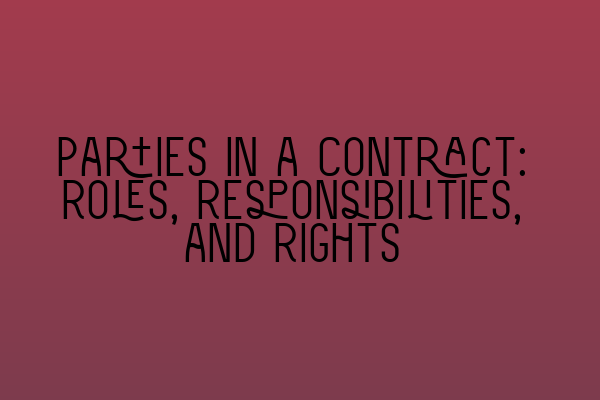Parties in a Contract: Roles, Responsibilities, and Rights
Contracts are fundamental to business transactions and legal agreements. They represent a formal agreement between two or more parties and outline the rights and responsibilities of each party involved. Understanding the roles, responsibilities, and rights of the parties in a contract is crucial for ensuring compliance, resolving disputes, and protecting your interests.
1. The Parties Involved
In a contract, there are typically two main parties: the offeror, who makes the offer, and the offeree, who accepts the offer. However, there may be additional parties involved, such as intermediaries or guarantors. Each party has specific roles and responsibilities that are essential for the contract’s validity.
The offeror is responsible for making a clear and specific offer to the offeree. This offer sets out the terms and conditions of the contract and may include details such as price, quantity, and timeline. The offeree, on the other hand, has the right to accept or reject the offer. If the offeree accepts the offer, a legally binding contract is formed.
2. Rights and Responsibilities of the Parties
Once a contract is formed, each party has certain rights and responsibilities that must be upheld. These rights and responsibilities may vary depending on the nature of the contract, but there are some common elements.
Performance of Obligations: Both parties have the responsibility to fulfill their obligations as outlined in the contract. This includes delivering goods or services, making payments, and meeting any other agreed-upon terms.
Confidentiality and Non-Disclosure: In some contracts, there may be a need for confidentiality or non-disclosure. Parties involved have the right to protect confidential information and prohibit its disclosure to third parties.
Termination: Some contracts may include provisions for termination. These provisions outline the circumstances under which either party can terminate the contract and the process that needs to be followed.
3. Resolving Disputes
Disputes may arise during the course of a contract, and it is important to have mechanisms in place to resolve them effectively. Contracts often include dispute resolution clauses that outline the process for resolving conflicts.
Mediation: Mediation involves a neutral third party who helps the parties in dispute to reach an agreement. It is a voluntary and confidential process that can help parties find a mutually satisfactory resolution.
Arbitration: Arbitration is a more formal process where a neutral arbitrator makes a decision on the dispute. The decision is binding and enforceable in a court of law.
4. Importance of Legal Assistance
Understanding the roles, responsibilities, and rights of parties in a contract can be complex. It is always recommended to seek legal assistance when entering into a contract to ensure that your rights are protected, and your responsibilities are fulfilled.
SQE Contract Law provides comprehensive training and preparation for the SQE exams, which are essential for a successful legal career. Our SQE 1 preparation courses and SQE 2 preparation courses equip aspiring solicitors with the knowledge and skills necessary to excel in their field. Additionally, our SQE 1 practice exam questions and practice mocks FLK1 FLK2 help candidates assess their readiness for the exams.
Stay informed about the latest SQE exam dates and ensure you are well-prepared. For more information and to enroll in our courses, visit fqps.co.uk.
